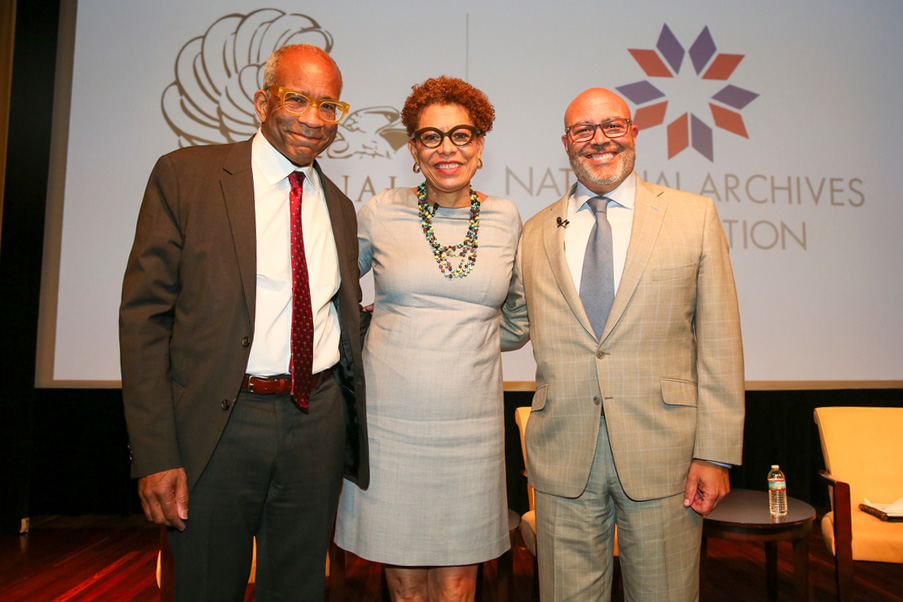
National Archives Panel Examines Legacy of Brown v. Board on 70th Anniversary
By Cara Moore Lebonick | National Archives News
WASHINGTON, May 22, 2024 – On May 16, in celebration of the 70th anniversary of the Supreme Court Brown v. Board of Education decision, the National Archives in Washington, DC, hosted a panel discussion on the lasting impact of the historic legal decision.
The panel included Sheryll D. Cashin, of Georgetown Law School, and Randall L. Kennedy, of Harvard Law School, both former law clerks of Supreme Court Justice Thurgood Marshall, the NAACP attorney who argued the case before the Supreme Court. The Honorable Michael K. Powell, President and Chief Executive Officer, NCTA—The Internet and Television Association, served as moderator for the event.
Archivist of the United States Dr. Colleen Shogan opened the event with welcoming remarks.
“The Brown decision was a pivotal moment in our nation’s history, laying the groundwork for the Civil Rights Movement and our ongoing pursuit of a more perfect union,” Shogan said. “At the National Archives we hold the records of this case and all other Supreme Court decisions. So, I’m glad we can bring together this panel of esteemed jurists who personally knew Justice Marshall to help us explore the impact and legacy of this watershed decision.”
The landmark 1954 case altered the landscape of education in the United States, determining that providing separate education facilities for children based on race led to unequal access. The resolution served as a precedent in advancing civil rights cases.
Powell offered a brief summary of the historical context leading up to the court decision, reminding the audience of the legal settings of the 13th, 14th, and 15th Amendments before asking the panelists about legal circumventions that resulted from the time.
Kennedy and Cashin discussed the Reconstruction Era and violent resistance, debating what “legal protection under law” can mean and where social issues can be tried. They examined legal precedents and individual influences to set the stage for Justice Marshall’s impactful rise.
“The most striking aspect of this opinion is that this is the most honored race-relations opinion delivered by the Supreme Court of the United States and is also an opinion that declines to candidly grapple with racism,” said Kennedy.
The panelists also discussed debate surrounding legal cases and circumstances, who set and moved them, and the violence that came after the ruling in some parts of the country.
“The biggest lasting legacy of Brown is that it captured the imagination of young Black people to say, ‘Hey, I’m free. I should be able to participate in whatever institutions the state is sponsoring on an equal basis,’ and that generation is willing to go in a thousand places within six, seven years—thousands of sit-ins all over the place, demanding to be free,” said Cashin.
“The court didn’t tell the country how to do it, and the years that followed were pretty bloody, pretty violent, the resistance pretty amazing,” added Powell.
A question-and-answer session with the audience followed the discussion.
The celebration of the Brown decision’s anniversary will continue June 24–28, when the Dwight D. Eisenhower Presidential Library will host the Civil Rights Conference: Brown v. Board of Education Decision 70th Anniversary.
Visit the National Archives Catalog online to view archival holdings related to Brown v. Board of Education.
View the discussion on the National Archives YouTube Channel.
Use the National Archives’ resource DOCSTeach, for more information about teaching about Brown v. Board of Education with online documents.
This program was made possible in part by the National Archives Foundation through the generous support of Verizon.
